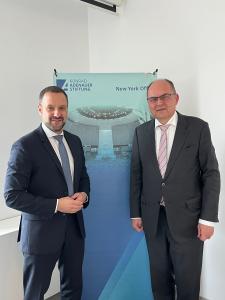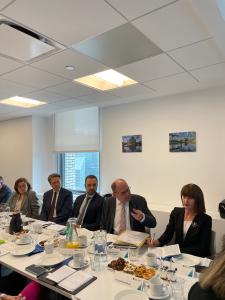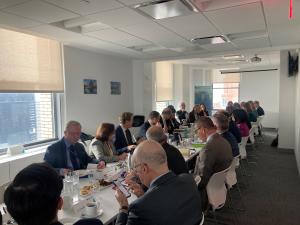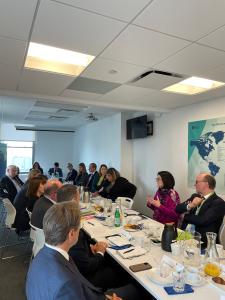On May 13, the Konrad Adenauer Foundation (KAS) New York Office, together with the Hanns Seidel Foundation Washington Office, hosted Christian Schmidt—High Representative for Bosnia and Herzegovina—for a high-level discussion with representatives of UN Member States and the expert community on recent developments and mounting challenges in the country. The discussion underscored the following takeaways:
- Nearly 30 years after the landmark Dayton Agreement, Bosnia and Herzegovina continues to face ongoing political instability, ethnic tensions, separatist rhetoric and actions, and systemic corruption, among other challenges. As the country approaches its third decade under the peace agreement, unity remains an elusive prospect, prompting much reflection and re-evaluation from the international community as to Dayton’s complex legacy. While it may have brought an end to the Bosnian war, the Dayton Agreement also created complicated governance structures which have reinforced ethnic divisions in the country.
- In light of the European Union’s recent opening of membership negotiations with Bosnia and Herzegovina, the country stands at a crossroads. The potential for European integration presents a momentous opportunity for Bosnia and Herzegovina, especially in terms of driving forward much-needed political, judicial, and economic reforms, bringing it closer to shared European values, and uniting the country towards a common goal.
- Bosnia and Herzegovina cannot undertake reform alone; the international community must stand united behind Bosnia and Herzegovina in its path towards integration and equip it with the necessary tools for sustainable peace, stability and progress. Recent amendments by the High Representative to the country’s election laws were highlighted as one such measure of support. For example, the use of biometric technology in voter registration will strengthen elections integrity and prevent voter fraud. A prohibition banning individuals convicted by any international or domestic court for the crime of genocide, crimes against humanity, or war crimes standing for election or holding any elective or appointed office will also help to restore people’s trust in the electoral process.
- As Bosnia and Herzegovina continues its path to peace and prosperity, the role of future generations was emphasized as especially key. The country currently faces a troubling “brain drain” among young people, which threatens significant economic and societal consequences in the future. It was stressed that young people need to be convinced of the country’s future and that perhaps the country’s progress towards EU membership can help in this regard. Similarly, teaching and telling young people the truths about the country’s troubled past was highlighted as a critical way to develop understanding and peaceful coexistence among different communities.






